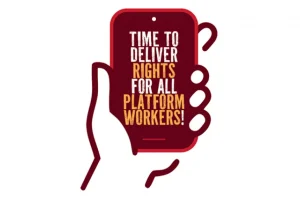
By Tony Burke
The International Trade Union Confederation (the global network of national trade union’s representing 200 million workers) has launched a campaign to secure a legally binding International Labour Organisation Convention (ILO) which will employment protection for all workers in the platform economy.
The ILO is the tripartite international body that represents governments, employers, and workers and its primary role is to set and enforce standards agreed upon by the tripartite body through an adopted Convention.
The term ‘platform workers’ or ‘gig workers’ was coined over a decade ago to describe workers and companies providing services such as ride hailing (taxi’s) such as Uber as well as fast food and package delivery.
However the term now covers many more workers and companies who utilise online platforms on smart phones, tablets or computers to connect with clients and customers offering services or performing tasks in exchange for payment including care giving, building services, software development, graphic design – either ‘on location’ or ‘online’ where platform workers carry out tasks remotely.
Most platform workers have no employment status with platform business’s arguing that the workers providing these service are not employees but are ‘independent contractors’, ‘partners’ or ‘associates’, – effectively self employed who utilise online platforms, via websites or apps, to find and connect with clients seeking their services.
In the UK the TUC calculates that 14.7% of working people in England and Wales, (approximately 4.4 million people), undertakes platform work at least once a week.
Over the past few years unions such as the GMB at Uber have launched organising campaigns and legal action to win basic union.
In Scandinavia and the USA unions and legislators including local authorities or licensing organisations have used legal routes to ban platform working outright which have been hit by employers and business challenges. With platforms becoming global and more common across a growing number of sectors and faced with the rapid development of Artificial Intelligence for trade unions and workers wanting to form unions it has been an uphill battle.
Platform workers face low pay, exploitation, mistreatment, poor working conditions and exclusion from social protections including working time and healthy & safety protections.
Platform companies continue to argue that platform workers have no employment relationship with them and therefore should not be covered by labour laws.
 The ILO’s International Labour Conference in June this year will decide on adopting a new Convention giving legal protection to platform workers. Unions and human rights organisations have expressed support for a Convention, but employers and some governments will push back hard, either to stop the process or if the ILC agrees to move to a legally binding Convention to try water down its effectiveness to a ‘recommendation’ or a toothless ILO Convention.
The ILO’s International Labour Conference in June this year will decide on adopting a new Convention giving legal protection to platform workers. Unions and human rights organisations have expressed support for a Convention, but employers and some governments will push back hard, either to stop the process or if the ILC agrees to move to a legally binding Convention to try water down its effectiveness to a ‘recommendation’ or a toothless ILO Convention.
The ITUC who will be leading the debate at the conference says a new convention should include:
* Guaranteeing basic labour protections, including living wages, occupational safety and health, and access to social security.
* Ensuring fundamental rights, including freedom of association and the right to collective bargaining, for all platform workers.
* Regulating working hours and safeguarding the right to disconnect.
* Addressing algorithmic management by regulating its use in surveillance, decision-making, and worker evaluation, while ensuring transparency and human oversight.
* Combating worker misclassification and requiring clear terms and conditions in contracts.
* Protecting migrant workers, who are disproportionately represented in platform work, regardless of migration status.
“Platform workers are not commodities. They deserve dignity, fair pay, the right to freedom of association and effective collective bargaining” says ITUC General Secretary Luc Triangle. He explains: “A binding ILO Convention is essential to ensure global standards that protect all workers in all countries, regardless of how their work is organised or classified. Without decisive action, the exploitation inherent in the platform economy could spread to all sectors of work and the economy, undermining democracy and fair competition globally.”
Having gone through its initial stages of providing reports and questionnaires the fight is now on to secure a binding international treaty that recognises that like electricity platform working will not be uninvented and the consequences for the world of work are enourmous.
The International Labour Conference takes place between June 2nd – 13th in Geneva, Switzerland.
